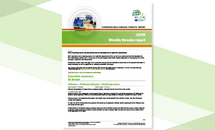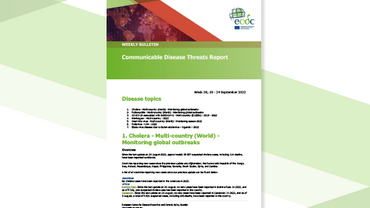Communicable disease threats report, 22-28 May 2016, week 21
The ECDC Communicable Disease Threats Report (CDTR) is a weekly bulletin for epidemiologists and health professionals on active public health threats. This issue covers the period 22-28 May 2016 and includes updates on Zika virus, outbreak of yellow fever and Polio.
Executive Summary
Seasonal influenza – Europe
In week 20/2016, influenza activity continued to decrease in the WHO European Region. Most countries (98%) reported low intensity.
Weekly online reporting for the 2015-2016 influenza season ends this week and will start again in week 40 for the next season. During the summer months, weekly reporting continues and the Flu News Europe online bulletins will be published monthly.
Zika virus infection
As of 26 May 2016, 51 countries and territories have reported autochthonous cases of Zika virus infection during the past nine months. There is now a scientific consensus that Zika virus is a cause of microcephaly and Guillain-Barré syndrome. Given this scientific consensus on the evidence of adverse pregnancy outcomes associated with Zika virus infection, ECDC recommends that pregnant women postpone non-essential travel to Zika-affected areas.
During the past week, WHO AFRO reported that sequencing of the Zika virus in Cape Verde by Institut Pasteur in Dakar confirmed that the virus currently circulating in Cape Verde is the same as the one circulating in the Americas - the Asian type and was most likely imported from Brazil. This is the first time that the Asian Zika strain has been detected in Africa.
In Brazil, the Ministry of Health informed the International Olympic Committee about the measures being taken to prevent and control Zika virus infections during the Olympics.
Yellow fever outbreak – Africa
An outbreak of yellow fever in Angola started in December 2015 in the municipality of Viana, Luanda province and spread to all the 18 provinces of Angola. A mass immunisation campaign is taking place.
The neighbouring Democratic Republic of Congo (DRC) reports imported cases of yellow fever and on 2 May the first confirmed autochthonous transmission in Kinshasa, the capital. On 5 may, DRC reported an additional autochthonous case in Kongo Central.
An outbreak of yellow fever not linked to the outbreak in Angola has been reported in several districts in Uganda.
Poliomyelitis
Global public health efforts are ongoing to eradicate polio, a crippling and potentially fatal disease, by immunising every child until transmission of the virus has completely stopped and the world becomes polio-free.
During the past week, WHO reported one new wild poliovirus type 1 (WPV1) case in Pakistan. There were no official circulating vaccine-derived poliovirus (cVDPV) cases reported.
The latest global polio epidemiology is on the agenda of the 69th World Health Assembly (Geneva, 23-28 May, 2016).
Download






